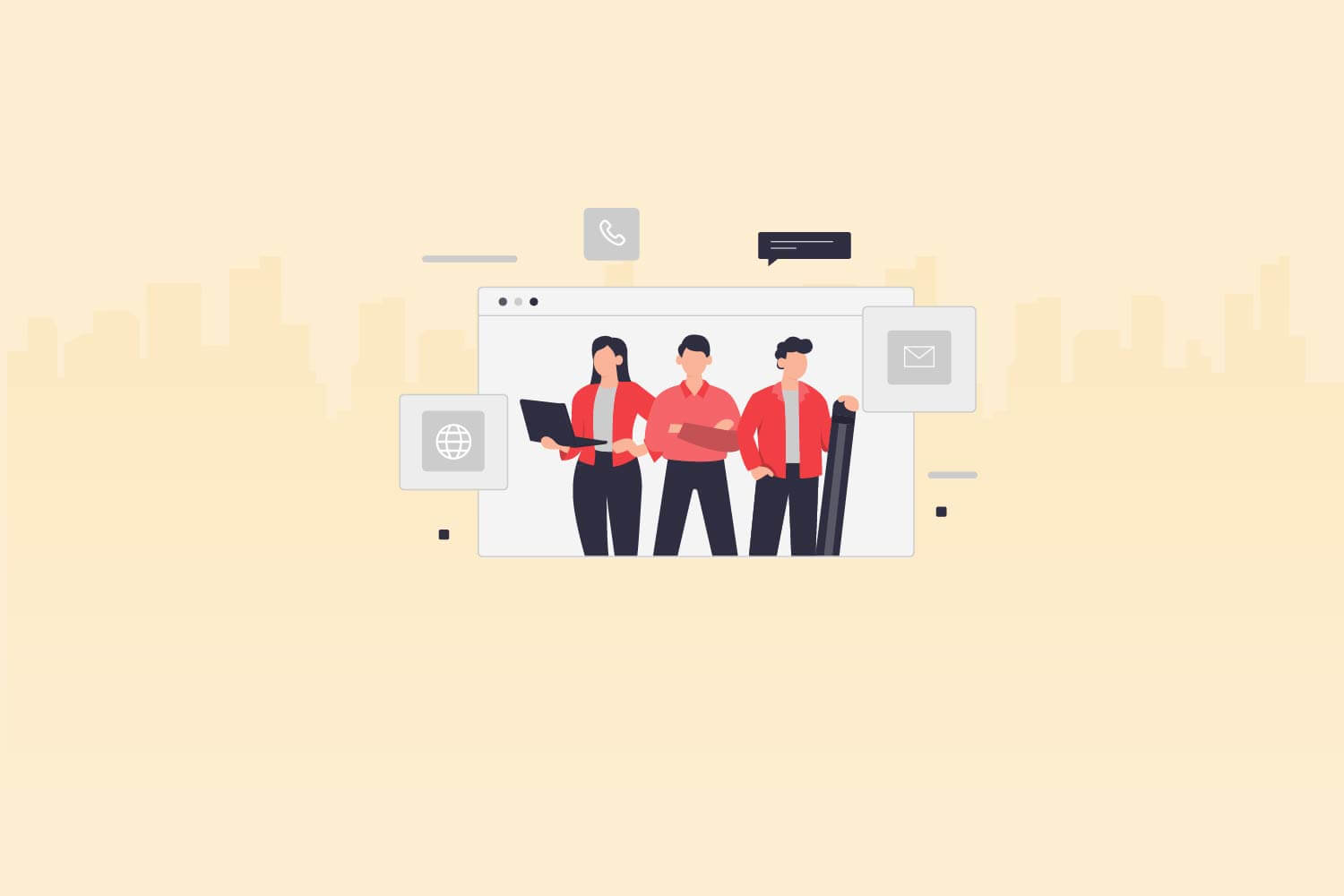If outsourcing is not your thing? then we have good news for you. More than 50% of wordpress developers hail from North America, according to a report published by deliciousbrains. But quantity does not always assure quality right? So to help you hire dedicated wordpress developer who can build that perfect website for your company.
In this blog we’ll talk about their hard skills, soft skills, average hiring costs, roles and everything else.
What is a WordPress developer?
A WordPress developer is a skilled professional responsible for crafting and maintaining websites using the WordPress content management system (CMS) that powers 43.1% of the web. This role plays a pivotal part in a company’s digital presence and growth strategy. Here’s a breakdown of their roles and contributions:
Roles and responsibilities:
- Website creation: WordPress developers design and develop websites from scratch, tailoring them to meet the company’s specific needs and branding.
- Theme and plugin development: They create custom themes and plugins or modify existing ones to enhance website functionality and aesthetics.
- Code optimization: WordPress developers optimize website code for speed, performance, and responsiveness across various devices.
- Troubleshooting: They identify and rectify technical issues, ensuring the website functions seamlessly.
- Content management: These professionals manage and update content, ensuring it remains fresh and engaging.
- Security maintenance: WordPress developers implement security measures to protect websites from potential threats and vulnerabilities.
- Search engine optimization (seo): They optimize websites for search engines, improving visibility and rankings.
- Collaboration: WordPress developers work closely with designers, content creators, and other team members to achieve project goals.
Contribution to company’s growth:
- Enhancing user experience: Creating user-friendly websites that attract and retain customers.
- Boosting online visibility: Improving SEO and ensuring the website ranks higher in search results.
- Driving engagement: Crafting visually appealing and interactive content that keeps visitors engaged.
- Increasing conversions: Optimizing websites to convert visitors into customers.
- Saving time and money: Streamlining website management and reducing maintenance costs.
- Adapting to trends: Staying updated with the latest web technologies to remain competitive.
In summary, a WordPress developer is not just a coder but a catalyst for online success, propelling your company’s growth in the digital realm.
Tasks done by a wordpress developer:
- Website design and development
- Theme and plugin customization
- Code optimization and debugging
- Content management and updates
- Security implementation
- SEO optimization
- Collaboration with cross-functional teams
Hard skills to assess in wordPress developers
When screening candidates for a WordPress developer position, it’s essential to evaluate their hard skills—the technical competencies that are the foundation of their role. Here are the key hard skills to look for and how to assess them:
1. Proficiency in web technologies:
- Html and css: Assess a candidate’s ability to create structured and styled web content.
- Php: Evaluate their knowledge of PHP, a scripting language crucial for WordPress development.
- JavaScript: Test their proficiency in JavaScript for interactive website elements.
- MySQL: Check their database management skills, as WordPress relies on MySQL.
2. WordPress expertise:
- Theme development: Ask for examples of custom themes they’ve created or modified.
- Plugin development: Inquire about their experience in building or customizing plugins to extend functionality.
- Custom post types and taxonomies: Assess their ability to work with advanced WordPress features.
- Hooks and filters: Evaluate their knowledge of these essential WordPress components.
3. Responsive design:
- Request samples of websites they’ve developed that display well on various devices and screen sizes.
- Check if they use CSS frameworks like Bootstrap to ensure responsiveness.
4. Version control (e.G., git):
- Confirm their familiarity with version control systems for collaborative coding.
5. Debugging and troubleshooting:
- Present a coding challenge or a broken website scenario to assess their problem-solving skills.
6. Performance optimization:
- Inquire about techniques they use to optimize website speed and performance.
- Review past projects for speed optimization results.
7. Security best practices:
- Ask about their methods for securing WordPress websites.
- Assess their knowledge of security plugins and practices.
8. Seo knowledge:
- Check their understanding of SEO principles and how they implement them in WordPress.
- Evaluate their ability to integrate third-party APIs for extended functionality.
10. Code quality and documentation:
- Review their code samples for readability, maintainability, and adherence to coding standards.
- Assess their documentation skills, as clear code documentation is essential for collaboration.
To assess these hard skills effectively, utilize coding tests, technical interviews, and portfolio reviews. Look for real-world examples of their work and ask for explanations of their problem-solving approaches. Assessing these skills meticulously ensures you hire a WordPress developer who can excel in their role and contribute to your company’s success.
Soft skills to assess in wordPress developers
In addition to technical expertise, assessing the soft skills of WordPress developers is crucial to ensure they’re a valuable asset to your team. Here are the key soft skills to look for and how to assess them:
- Effective communication is essential for collaboration. Evaluate a candidate’s ability to convey complex technical concepts clearly to non-technical team members.
- WordPress developers often encounter challenges that require creative problem-solving. Present a hypothetical issue and ask the candidate to outline their approach to solving it.
- Meticulous attention to detail is vital for error-free code and design. Review their portfolio for evidence of pixel-perfect work.
- The digital landscape evolves rapidly. Assess a candidate’s willingness and ability to adapt to new technologies and trends.
- Effective time management ensures projects stay on schedule. Ask about their project management methods and how they prioritize tasks.
- Collaboration is key in web development. Inquire about their experience working in cross-functional teams and their ability to accept feedback.
7. Client-Focused Approach:
- WordPress developers often work with clients. Assess their ability to understand and meet client expectations.
8. Creativity:
- Creativity is essential for designing unique and engaging websites. Review their portfolio for innovative design and functionality.
9. Patience:
- Coding can be challenging, and debugging can be time-consuming. Evaluate their patience and persistence in overcoming obstacles.
10. Problem Anticipation:
- Ask about their ability to foresee potential issues in a project and proactively address them.
To assess these soft skills, conduct behavioral interviews, and scenario-based assessments. Ask for examples from their past experiences that demonstrate these qualities. Look for candidates who not only possess technical prowess but also exhibit strong soft skills, as they will contribute to a harmonious and productive work environment and enhance your team’s overall effectiveness.
How to test a WordPress developer’s skills
Testing a WordPress developer’s skills is a crucial step in the hiring process, ensuring that the candidate possesses the technical competencies required for the role. Here are different technical tests you can employ and why they are important:
- Provide candidates with real-world coding challenges to assess their problem-solving and coding abilities.
- Importance: Coding challenges reveal a candidate’s hands-on skills and their approach to tackling practical issues.
2. Portfolio Review:
- Examine the candidate’s portfolio to evaluate their past projects, design aesthetics, and the functionality of the websites they’ve built.
- Importance: Portfolios offer concrete evidence of a candidate’s abilities and style.
3. Technical Assessments:
- Administer technical assessments that focus on WordPress-specific tasks, such as theme customization or plugin development.
- Importance: These assessments ensure candidates have the specific skills needed for WordPress development.
4. Code Review:
- Ask candidates to review and suggest improvements for a given piece of code, highlighting their attention to detail and code quality assessment.
- Importance: Code review tests reveal a candidate’s ability to identify and rectify issues in existing code.
5. Problem-Solving Scenarios:
- Present candidates with hypothetical WordPress-related problems and evaluate their problem-solving skills.
- Importance: Problem-solving scenarios assess a candidate’s ability to think critically and find practical solutions.
6. Live Coding Interviews:
- Conduct live coding sessions during interviews to observe how candidates code in real-time.
- Importance: Live coding interviews provide insights into a candidate’s coding style, efficiency, and ability to handle pressure.
Each of these tests plays a vital role in assessing a WordPress developer’s skills from various angles. Employing a combination of these tests helps ensure that you make an informed decision when selecting the right candidate for your team, ultimately leading to successful web development projects.
Where to find the best WordPress developer
Finding the best WordPress developer for your team requires casting a wide net and exploring various platforms to discover top-tier talent. Here’s how you can locate the right candidate for the role and leverage these platforms effectively:
1. Job boards:
- Websites like Indeed, LinkedIn, and Glassdoor host job listings where you can post your WordPress developer job opening.
- Importance: Job boards allow you to reach a broad audience and attract both local and remote talent.
2. Freelance Platforms:
- Platforms like Upwork, Freelancer, and Toptal provide access to a global pool of freelance WordPress developers.
- Importance: Freelance platforms offer flexibility and scalability, ideal for short-term or project-specific needs.
3. Professional Networks:
- Tap into your professional network through LinkedIn and industry-specific groups to seek recommendations or referrals.
- Importance: Recommendations from trusted sources can help you find candidates with proven track records.
4. WordPress Communities:
- Participate in WordPress forums, groups, and communities like WordPress.org, WPBeginner, or local WordPress meetups.
- Importance: These communities are hubs for WordPress experts and enthusiasts, making it easier to connect with potential candidates.
5. Recruitment Agencies:
- Consider partnering with recruitment agencies specializing in tech and web development roles.
- Importance: Recruitment agencies have access to a curated pool of talent and can assist in the screening process.
6. Company website and social media:
- Promote the job opening on your company website and share it across your social media channels.
- Importance: Leveraging your online presence helps attract candidates who are already familiar with your brand and culture.
7. Github and stack overflow:
- Explore coding repositories on GitHub and technical Q&A forums like Stack Overflow to identify experienced developers.
- Importance: These platforms showcase a developer’s coding expertise and contributions to the developer community.
8. WordPress-specific job boards:
- Utilize specialized job boards like WP Hired, WPhired, or WP Mayor Jobs, which cater specifically to WordPress professionals.
- Importance: Niche job boards connect you directly with WordPress experts who specialize in the CMS.
By strategically leveraging these platforms and networks, you can increase your chances of finding the best-suited WordPress developer for your team. Remember that the ideal candidate may be found in various places, so casting a wide net ensures you have access to a diverse pool of talent to choose from.
Job description template for a WordPress developer position:
About Us:
[Insert a brief introduction about your company, its mission, and values. Highlight what sets your company apart.]
Responsibilities:
- Design, develop, and maintain responsive WordPress websites, themes, and plugins.
- Collaborate with cross-functional teams to gather project requirements and execute web development tasks.
- Optimize websites for speed, performance, and search engine optimization (SEO).
- Troubleshoot and resolve technical issues, bugs, and compatibility problems.
- Ensure web security measures are implemented and regularly updated.
- Stay up-to-date with industry trends and WordPress updates.
- Provide technical support and guidance to team members and clients as needed.
Qualifications:
- Proven experience as a WordPress developer, with a strong portfolio of WordPress projects.
- Proficiency in HTML, CSS, PHP, JavaScript, and MySQL.
- In-depth knowledge of WordPress, themes, and plugins, along with customization and development experience.
- Experience with responsive design and CSS frameworks like Bootstrap.
- Familiarity with version control systems (e.g., Git).
- Strong problem-solving skills and attention to detail.
- Effective communication and teamwork abilities.
- Bachelor’s degree in Computer Science or related field (preferred but not mandatory).
Why join us?
[Highlight the unique selling points of your company, such as a positive work culture, opportunities for growth, or exciting projects.]
Benefits:
- Competitive salary based on experience.
- Health, dental, and vision insurance coverage.
- Generous paid time off and holidays.
- Professional development and training opportunities.
- Collaborative and creative work environment.
- Opportunities to work on cutting-edge projects.
- Flexible work hours and remote work options.
Application process:
Interested candidates are encouraged to submit their resume and a link to their portfolio showcasing WordPress projects to [Email Address]. Please include “WordPress Developer Application” in the subject line.
Other important information:
- Location: [Specify if the position is on-site, remote, or a combination]
- Employment Type: [Full-time, Part-time, Contract]
- Application Deadline: [Insert Deadline if Applicable]
- Contact Information: [HR Contact Name, Email, and Phone Number]
Feel free to tailor this job description template to match your company’s specific needs and culture before posting it on various job boards and sharing it with potential candidates.
Cost of WordPress developers in the US market
- Entry-Level WordPress Developer: Developers with 1-2 years of experience typically command an average hourly rate of $20 to $40, or an annual salary ranging from $40,000 to $80,000.
- Mid-Level WordPress Developer: Developers with 3-5 years of experience earn an average hourly rate of $40 to $70, with an annual salary ranging from $80,000 to $140,000.
- Senior-Level WordPress Developer: Highly experienced developers with over 5 years of expertise demand hourly rates of $70 to $100 or annual salaries exceeding $140,000.
These figures can fluctuate based on location, complexity of projects, and specific skills required, demonstrating the importance of considering individual factors when determining WordPress developer compensation.
Interview questions for WordPress developers
Conducting a comprehensive interview is crucial when hiring a WordPress developer. Here are the top 15 questions categorized by soft skills, hard skills, and general skills, along with a brief introduction on the importance of each category:
Soft skills:
- Communication:
- Describe a complex technical concept you’ve had to explain to a non-technical team member or client.
- Problem-Solving:
- Can you share an example of a challenging issue you encountered in a WordPress project and how you resolved it?
- Adaptability:
- How do you stay updated with the latest WordPress trends and technologies, and how do you apply them to your work?
- How do you prioritize tasks and manage your time to meet project deadlines effectively?
- Collaboration:
- Describe a situation where you had to work closely with designers or content creators to achieve project goals.
Hard skills:
- WordPress-specific knowledge:
- Explain the difference between posts and pages in WordPress. How do you create custom post types and taxonomies?
- Coding skills:
- Can you provide examples of your experience with PHP, HTML, CSS, and JavaScript in WordPress development?
- Plugin and theme development:
- Describe your experience in creating custom plugins or themes for WordPress. Can you share a notable project?
- Seo optimization:
- What SEO best practices do you follow when developing WordPress websites?
- Security measures:
- How do you ensure the security of a WordPress website, and what security plugins do you prefer to use?
General skills:
- Version control:
- Have you worked with version control systems like Git? Explain your experience with them.
- Performance optimization:
- What strategies do you employ to optimize the speed and performance of a WordPress website?
- Client interaction:
- How do you handle client feedback and ensure their needs are met during a project?
- Quality assurance:
- What methods do you use to test and debug your WordPress projects?
- Coding standards:
- Do you adhere to coding standards and best practices in WordPress development? Can you provide examples?
Asking these questions helps you assess a candidate’s technical proficiency, problem-solving abilities, and alignment with your company’s culture and project requirements, ensuring you hire a WordPress developer who can excel in their role.
Assess for wordPress developer skills to avoid mis-hires
To build a top-notch WordPress development team, it’s imperative to assess candidates rigorously, minimizing the risk of mis-hires. Skill assessments not only expedite the hiring process but also ensure that you’re selecting the right fit for your organization.
Reducing time to hire:
Assessments provide quick insights into a candidate’s technical competencies and problem-solving abilities. By streamlining the evaluation process, you can significantly reduce time-to-hire, allowing your team to focus on quality candidates.
Assessing better:
Detailed skill assessments allow you to dive deep into a candidate’s WordPress expertise. You can measure their coding proficiency, understanding of WordPress architecture, and responsiveness to real-world challenges.
Discover Testlify – your talent assessment partner:
Leverage Testlify, a leading talent assessment tool, to streamline your WordPress developer hiring process. With a wide range of customizable assessments, you can tailor evaluations to match your specific needs. Make informed decisions, avoid mis-hires, and build a robust WordPress development team.
Schedule a demo:
Ready to assess WordPress developer skills effectively? Schedule a call with Testlify for a personalized demo today and witness how our platform can elevate your hiring process. Your dream WordPress team is just a click away.







